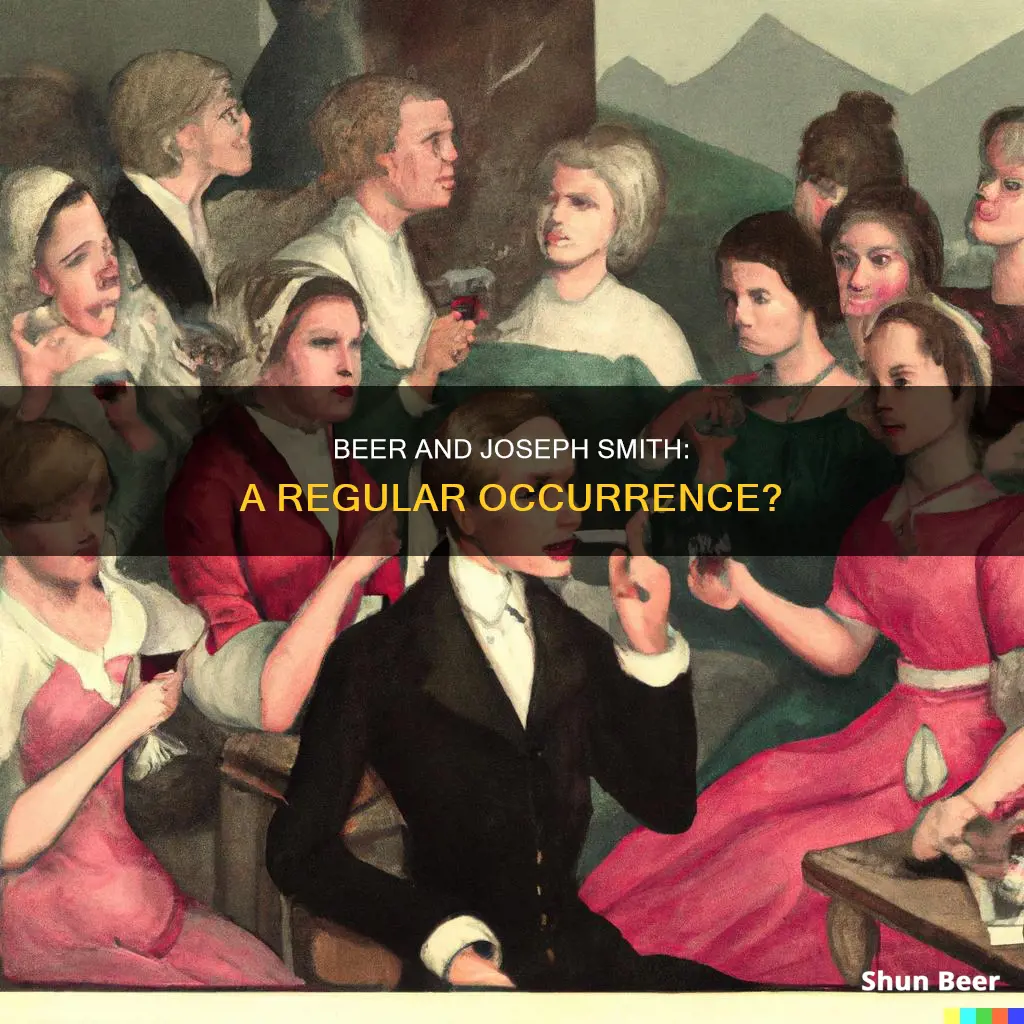
There is evidence to suggest that Joseph Smith did drink beer, and alcohol more generally, on several occasions. In his journals, Smith notes that he drank a glass of beer at Mooessers in June 1844. In the last six months of his life, Smith is recorded to have drunk alcohol at least three times, and in the last month of his life, at least twice.
However, it is important to note that Smith's drinking was not necessarily considered excessive for his time and place. The Word of Wisdom, a revelation from God that Smith received in 1833, did not demand total abstinence from alcohol but instead stressed moderation and self-control. Smith himself never interpreted the revelation as requiring complete abstinence. In fact, beer and other mildly alcoholic drinks were considered acceptable under certain circumstances.
| Characteristics | Values |
|---|---|
| Did Joseph Smith drink alcohol? | Yes, there is substantial evidence that Joseph Smith drank alcohol on numerous occasions. |
| Did Joseph Smith drink alcohol before the Word of Wisdom was revealed? | Yes, Martin Harris testified that Joseph "drank too much liquor" before he translated the Book of Mormon. |
| Did Joseph Smith drink alcohol after the Word of Wisdom was revealed? | Yes, his journals include several instances of him drinking wine and beer. |
| Did Joseph Smith drink in moderation? | Yes, Joseph Smith never interpreted the Word of Wisdom revelation as demanding total abstinence but stressed moderation and self-control. |
| Did Joseph Smith allow the sale and distribution of alcohol from his home? | Yes, Joseph Smith had a bar in his home and a liquor license to distribute and sell alcohol. |
What You'll Learn

Joseph Smith's drinking habits
Evidence of Alcohol Consumption
There is substantial evidence that Joseph Smith, the founder of the Latter-day Saint movement, consumed alcohol at various times in his life. Specific references to his alcohol consumption can be found in Latter-day Saint (LDS) sources and his personal journals. For example:
- On May 3, 1843, Smith drank a glass of wine with Sister Janetta Richards, made by her mother in England.
- On January 29, 1844, he drank a toast with Captain White of Quincy.
- On June 1, 1844, he drank a glass of beer at a local tavern.
- On June 27, 1844, Smith drank wine along with Dr. Richards and Brother Taylor while in confinement.
In the last six months of his life, LDS records indicate that Smith drank alcohol at least three times, with two instances occurring in the last month before his death.
Drinking Culture in Early America
It is important to understand the cultural context of alcohol consumption during Smith's lifetime. In the 1800s, alcohol was a common part of daily life in America. Per capita consumption of distilled spirits was significantly higher than it is today, and drinking was accepted and widespread. This was partly due to the unpurified water supply, which made alcoholic beverages a safer alternative. Additionally, the American Revolution led to a shift from rum to whiskey, with grain farmers finding it more economical to produce whiskey than ship perishable grains.
The Word of Wisdom
In 1833, Smith received a revelation known as the "Word of Wisdom," which advised against the consumption of "wine or strong drink" and tobacco. This revelation was influenced by the growing temperance movement and health reform sentiments of the time. However, it is important to note that the Word of Wisdom was initially given "not by commandment" and was interpreted differently than it is today.
Smith's Interpretation and Practice
Smith himself never interpreted the Word of Wisdom as demanding total abstinence from alcohol. He viewed excessive drinking as a "monster" and "the bane of humanity" but believed in moderation and self-control. Beer, unfermented or lightly fermented wine, and cider were considered "mild drinks" and acceptable under certain circumstances. For example, whiskey was allowed as a stimulant during travel, as long as one did not get drunk.
Smith's drinking habits included both sacramental and non-sacramental occasions. He drank wine at weddings and in the Kirtland Temple, in accordance with the Word of Wisdom's allowance for sacramental use. However, he also drank wine and beer outside of these religious contexts. Additionally, there was a bar in his home, and he obtained a liquor license to distribute alcohol.
In conclusion, while Joseph Smith did consume alcohol, his drinking habits are best understood within the cultural and historical context of his time. The interpretation and observance of the Word of Wisdom have evolved over time, and complete abstinence from alcohol was a gradual process for the Latter-day Saints. Smith's drinking practices reflected the norms of his era, and he did not view occasional and moderate consumption as contradictory to his religious teachings.
Tooth Extraction and Beer: What's Safe?
You may want to see also

The Word of Wisdom
Every morning after breakfast, the men met in the school to hear instruction from Joseph Smith. The room was very small, with about 25 elders packed inside. The first thing they did after sitting down was to "light a pipe and begin to talk about the great things of the kingdom and puff away," as recounted by Brigham Young. The clouds of smoke were so thick that they obscured Joseph from view. Once the pipes were smoked out, the men would then chew tobacco and spit it onto the floor.
Joseph Smith's wife, Emma, expressed concern about this environment, as she was tasked with scrubbing the tobacco spittle from the hardwood floor. The stains were impossible to get out, and the room was also used by Joseph as his "translation room" where he received revelations. Joseph began inquiring of the Lord about what could be done, and on February 27, 1833, he received the revelation later canonized as the Word of Wisdom. The answer was clear: "Tobacco is not for man but is for bruises & all sick cattle; to be used with judgement & skill."
The complete prohibition on alcohol was phased in gradually, and it was not until the early 20th century that the Church accepted a more exacting standard of observance, calling on all Saints to completely abstain from alcohol, coffee, tea, and tobacco. Today, Church members are expected to live by this higher standard.
DayQuil and Beer: Safe Mix?
You may want to see also

The Kirtland Temperance Society
The Temperance movement was prominent in the 19th and early 20th centuries, particularly in English-speaking, Scandinavian, and majority Protestant countries. It eventually led to national prohibitions in Canada, Norway, Finland, and the United States, as well as provincial prohibition in India.
The Word of Wisdom, received by Joseph Smith on February 27, 1833, is considered by many members of the Church to be solid evidence that the Church is true. It outlines principles of healthy living that go beyond the scientific knowledge of the 1800s. The 1833 dietary guidelines sound similar to the recommended "food pyramid" produced by federally-funded research in the past decade.
The Word of Wisdom was not enforced as rigorously in Joseph Smith's day. It was not the strict test of fellowships that it is for modern members. The complete prohibition on alcohol was phased in gradually.
The Word of Wisdom was influenced by the Temperance movement. In June 1830, the Millennial Harbinger quoted from a book, "The Simplicity of Health", which strongly condemned the use of alcohol and tobacco. This gave publicity to the movement, and Temperance Societies began to form.
The Word of Wisdom was not given by way of commandment or restraint but by revelation. It took time for such practices to catch on, and it was not until the 1920s and 1930s that the Word of Wisdom was formalized and spelled out.
The Word of Wisdom talks about the use of grains, saying, "All grain is ordained for the use of man and of beasts, to be the staff of life" (Doctrine and Covenants 89:14). It mentions barley and its uses for mild drinks. At the time, beer had a low alcohol content, and it may have been considered a mild drink.
Beer Drinking and Triglycerides: What's the Connection?
You may want to see also

Alcohol in the 1800s
Alcohol consumption in the 19th century was commonplace, with Americans drinking at home, at work, and while travelling. In fact, drinking was so common that children would often consume alcohol with their breakfast before school!
The 1800s saw the emergence of the temperance movement, which sought to curb the excessive drinking that was prevalent at the time. This movement was driven by a variety of factors, including changing social norms, industrialization, and urbanization. The Puritans, for example, believed that "drink is in itself a good Creature of God, and to be received with thankfulness... but the abuse of drink is from Satan."
The Word of Wisdom, a revelation received by Joseph Smith in 1833, also instructed followers to avoid tobacco and alcoholic beverages. However, it is worth noting that the interpretation and enforcement of this revelation have evolved over time. While Joseph Smith did not interpret it as demanding total abstinence, the Church later adopted a more stringent stance, with complete prohibition being phased in gradually.
During the 19th century, alcohol was also widely used for medicinal purposes. It was not uncommon for doctors to prescribe liquor or wine to patients, and patent medicines containing alcohol were marketed as cures for various ailments.
By the mid-1800s, local temperance societies began to emerge across the United States, and the American Temperance Society was formed in 1826. The movement gained momentum, and by the early 1900s, scientific medicines were more widely available, leading to a shift towards a more exacting standard of observance.
Should Dogs Drink Beer? A Quick Guide for Owners
You may want to see also

The Prophet's interpretation of the Word of Wisdom
The Word of Wisdom, as revealed to Joseph Smith, is a commandment for the physical and spiritual benefit of God's children. It is now recorded in section 89 of the Doctrine and Covenants.
In the Word of Wisdom, the Lord teaches healthy practices and prohibits some substances that are not good for the human body. The Word of Wisdom reveals that the following foods are good: fruits and wholesome herbs, including vegetables, which should be used "with prudence and thanksgiving"; the flesh "of beasts and of the fowls of the air", which is "to be used sparingly"; and grains such as wheat, rice, and oats, which are "the staff of life".
The Word of Wisdom also reveals that the following substances are harmful: alcohol, tobacco, tea, coffee, and hot drinks.
The Word of Wisdom promises increased health, wisdom, knowledge, and protection to those who obey it.
Beer and the Bible: Drinking Guidelines
You may want to see also
Frequently asked questions
Yes, Joseph Smith drank alcohol before the Word of Wisdom was revealed in 1833. Martin Harris testified that Joseph "drank too much liquor" prior to translating the Book of Mormon.
Yes, Joseph Smith drank alcohol after the Word of Wisdom was revealed. His journals mention several occasions on which he drank wine, beer, and whiskey.
No, Joseph Smith did not interpret the Word of Wisdom as demanding total abstinence from alcohol. He viewed excessive drinking as "the bane of humanity" and encouraged moderation and self-control.
While Joseph Smith drank alcohol and was tempted by whiskey, there is no substantial evidence to suggest that he had a drinking problem or was an alcoholic.







